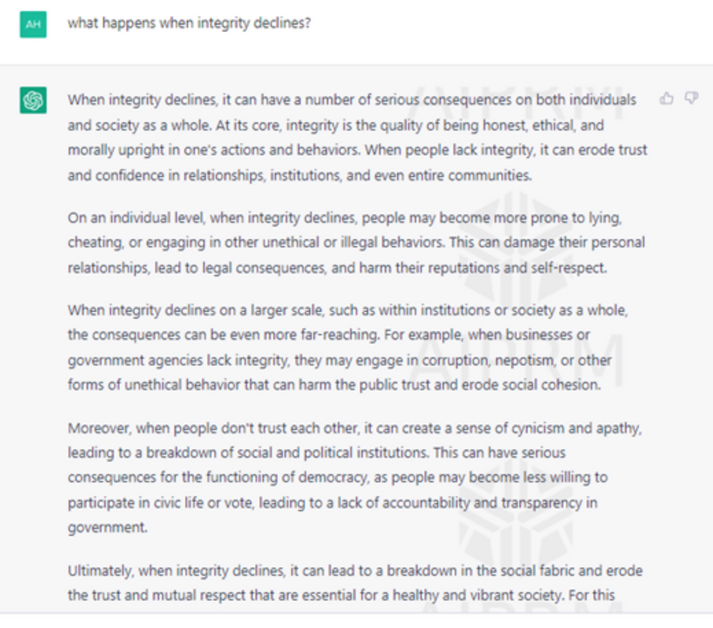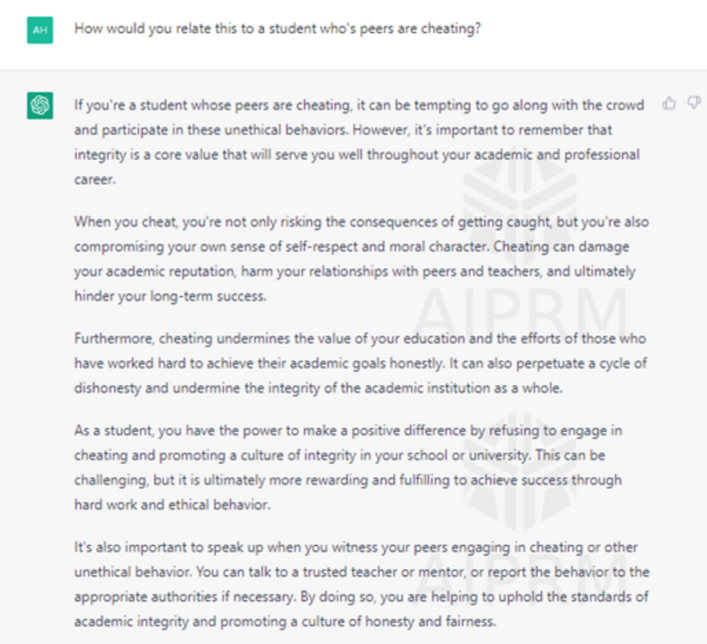Last week we discussed the three guiding principles we use at HL Group (if you missed it – you can read the post here.) They are Respect, Communication, and Integrity.
The third, Integrity, has been on my mind quite a bit lately as I’ve been learning new AI tools like ChatGPT.
AI tools – and technology in general – have evolved significantly. The availability of different technologies and tools can make it really easy to cheat or at least cut corners – challenging your principles – especially your Integrity.
Doing the right thing can take a little more effort (or a lot more, depending on the situation), so those core values are up against a lot.
Are Principles on the Decline?
The standards that we hold ourselves and others to seem to be slipping. It’s not hard to scan the news daily and find examples. Just look at the number of political leaders lying about their backgrounds these days.
Not that this has never happened in the past. But what I find disturbing is our willingness to let it go – because “everybody does it” or some other reason that seems to be more important than holding our leaders to standards.
Out of curiosity, I asked ChatGPT about declining Integrity:
I love this tool. But I digress.
Taking shortcuts can have some long-range effects.
Take the example of a student who wonders why she even bothers doing the work for her online classes. She sees many of her peers cheating and blowing the curve. If she takes an honest approach, she won’t have the perfect scores of others and will be essentially punished for her honest effort.
Now look a few years down the road, and those students have graduated. Their future employers will expect them to have a level of knowledge associated with their degree – that they may not possess.
What could that look like down the road?
- Those kids may then struggle or even fail at those positions.
- The employer may associate the lack of preparedness with the university that gave them the degree.
- The university’s reputation could suffer.
- And on, and on, and on
Here’s what ChatGPT had to say about this scenario:
The Other Key Principles
While I’ve focused mainly on Integrity here, Wes also talked about two other principles that guide our team – Respect and Communication.
The content that I received back from ChatGPT in both examples is good – very good, actually. I can see how there would be a temptation just to copy that into my work and call it my own.
But it isn’t mine. Just as I don’t want to be lied to, I’m not going to pretend that something I haven’t written is my content. In my world, that’s showing Respect to the reader.
Clarity in Communications relies on trusting the voice producing the information. As you build relationships with people, and they begin to rely on the information you provide, I think it’s important to be forthcoming in our sources of information. How else can you build trust?
And Even More Tools
AI isn’t the only technology impacting these principles. Tools like Zoom, Teams, Slack, LinkedIn, YouTube, and even texting and emailing have drastically changed how we interact – but not always in a good way.
Tools like these make it easy to reach out in a moment – regardless of the day of the week or the hour of the day.
I used to send emails at crazy hours, intending them to be viewed the next business morning. But now, with instant notification, alerts are sent immediately – interrupting and probably irritating the recipient. So I’ve adjusted that practice to respect the recipient’s time.
Each of these tools offers great communication options. However, sometimes the clearest and most efficient way to ensure that we’re all on the same page is to pick up the phone (or turn on that camera) and talk.
Using Our Powers for Good
AI tools and other technologies aren’t the enemies here. They can be hugely helpful – but we need to use their powers for “good.”
The tools can’t do the work for me – and I shouldn’t try to make them. The success of each of our organizations relies on the collective contributions of our team members.
And those contributions are strongest when our principles guide them.
How is your organization aligning principles and technology? I’d love to hear your perspective.




